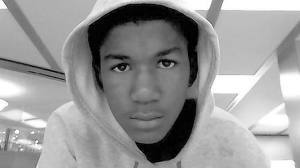Hearing Trayvon Die

HearingTrayvon Die byMark Anthony Neal | NewBlackMan
Thereis dramatic moment in the film CadillacRecords, when musician Muddy Waters, portrayed by Jeffrey Wright, has justwatched the body of fellow musician Little Walter (Columbus Short) taken away tothe morgue. Little Walter was morethan Waters' wingman—he was critical to how Waters literally heard himself in the world. Trying to come to terms with LittleWalter's death, Waters walks upstairs into a bathroom, off-screen, and utters aseries of bone-chilling howls that sound like death itself. It is simply the most arresting momentin the film, and tellingly a moment in which the sounds of death aredisembodied from the Black man who is so tortured by the loss of a brother.
Iimmediately thought about that scene in the film, hearing the 911-tapes thatcapture—unquestionably in my mind—the death of 17-year-old Trayvon Martin, atthe hands of George Zimmerman. Ina world in which Blackness is visually over-determined—both as hyper-visibleand invisible—there is no ocular meme more pervasive in American society thanthat of the so-called violent and dangerous Black male, who is always alreadyin need of pursuit, capture, incarceration and inevitably extermination.
Sopowerful is this script, that the fact that such levels of surveillance—fromthe classroom to the interstate—is un-American, is rarely disturbed in theminds of most Americans, including far too many Blacks. That more than a few corporations,often with direct input from Black men themselves, have turned the image of the menacing Black male into acottage industry (dating back Birth of aNation's "Gus") only speaks to how normative such an image has become.
Thisis the a point made recently by The Opportunity Agenda in theirreport "MediaRepresentations and the Impact on the Lives of Black Men and Boys," whichsuggest correlations between media depictions of Black males and lowered lifechances. Specifically the reportssuggest casual links between media portrays of Black males and public attitudesdirected towards them including "generalantagonisms," "exaggerated viewsrelated to criminality and violence," "lack of identification with or sympathyfor black males," and "public support for punitive approaches to problems"related to Black males—all dynamics that have played out in the corporate mediacoverage of Trayvon Martin's murder.
Noneof these observations are surprising to anyone who lives in the body of a Blackmale, but the report's highlighting of the casualness of these links suggeststhat most Americans have no other way to view Black men. In their most benign forms, such viewsfind older White women clutching their bags in elevators; in its everyday formsBlack males are harassed by law enforcement and denied access to equalopportunity; in its most tragic forms, a 17-year-old boy is shot dead by a neighborhoodwatch captain—and his death is reduced to, if we are to believe Today Show host Matt Lauer, a disputebetween two men, as opposed to anadult male pursuing and killing a child because he "looked" dangerous.
Asthe images of Black males have literally filled the whole frame—in ourimaginations and on our iPad screens—their humanity is exponentially squeezedout. Part of the reason thatJeffrey Wright's howling had to be experienced off-screen is that we have solittle understanding of Black males, as vulnerable, in pain, under duress, interror and confronting death. Associal scientist Richard Majors acknowledged twenty years ago in his book Cool Pose : The Dilemmas of Black Manhood inAmerica, so many of the visual and physical cues performed by Black malesare simply masking their vulnerabilities.
Thepursuit of justice aside, in his dying moments, Trayvon Martin gave voice toall of the Black men, women and children whose humanity continues to be denied in asociety that has long chosen to not listen to us.
***
MarkAnthony Neal is the author of five books including the forthcoming Looking For Leroy: (Il)Legible BlackMasculinities (New York University Press). He is professor of Black PopularCulture in the Department of African & African-American Studies at DukeUniversity and the host of the Weekly Webcast Left of Black. Follow him on Twitter @NewBlackMan.
Published on March 19, 2012 09:26
No comments have been added yet.
Mark Anthony Neal's Blog
- Mark Anthony Neal's profile
- 30 followers
Mark Anthony Neal isn't a Goodreads Author
(yet),
but they
do have a blog,
so here are some recent posts imported from
their feed.



